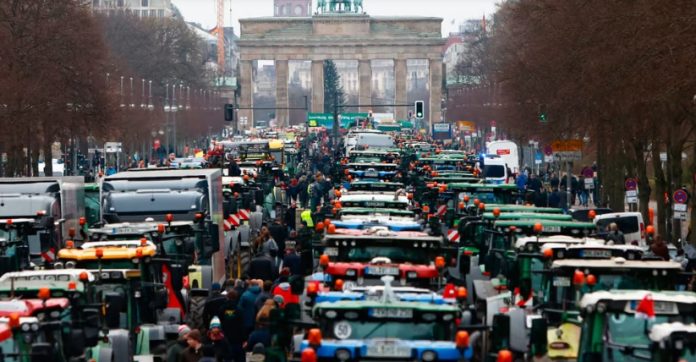German farmers kicked off a week of nationwide protests by blocking roads with tractors on Monday in response to plans to phase out farm subsidies as the coalition government tries to improve its financial situation.
The symbolism that German farmers chose to express their discontent with the government in the first days of the new year was quite unambiguous and ominous: across the country, improvised gallows with traffic light signs hanging from the sides of rural roads – a reference to the colours of the three ruling parties – could be seen on the sides of rural roads.
The sculptures are harbingers of unprecedented cross-industry protests and strikes that will begin on German roads and railways from Monday, and suggest a dramatic shift in mood in a country long renowned for its consensus-seeking approach to industrial relations, especially compared with neighbouring France, which is more traditionally strike-prone.
With key elections looming in Germany’s eastern states this year, even some farmers fear the new revolutionary spirit could play into the hands of the AfD gaining ground.
Despite the government’s partial U-turn on diesel subsidy cuts and tax breaks on farm machinery that sparked the protests, an eight-day protest by farm workers that included motorway closures and was described by the head of a farmers’ association as “the likes of which the country has never experienced before” will continue.
On Thursday night, in a sign of anger at the protests, about 100 farmers blocked Vice Chancellor and Economy Minister Robert Habeck from disembarking from a ferry in northern Germany, forcing him to turn back to the island where he was on holiday. A Green Party spokesman offered some of the protesters the opportunity to air their concerns on the ferry, but they declined. Habeck said in a statement on Friday:
“It makes me thoughtful, yes, even concerned, that the mood in the country is heating up to such an extent.”
Truckers are promising to join farmers’ protests to express their discontent with the toll increases for heavy goods vehicles that came into effect at the beginning of December, starting with blockades in regional centres and ending with a truck rally in the federal capital Berlin on 18 and 19 January.
Protests by self-employed farmers and hauliers, as well as strikes in the state railway sector, are not coordinated; protesters are making different demands and in some cases the subject of the protests are disputes that predate the current government. On its social media channels, the Alternative für Deutschland (AfD) party said ordinary people were “driven to ruin by irresponsible political leadership as in the Middle Ages” and called on citizens to join what it called a “general strike”.
Germany’s 256,000 agricultural enterprises employ about 2% of the national labour force, but despite the rather small numbers, farmers farm about half of Germany’s land area, and industry representatives stress that the country’s geographical location and soil quality should secure their sector’s future even in times of global warming.
The subsidy cuts that have infuriated German farmers this winter were not so much planned as imposed on Chancellor Olaf Scholz’s government by the opposition, which is now gleefully rubbing its hands together.
In November, Germany’s constitutional court ruled the long-term “Climate and Transformation Fund” unconstitutional after the centre-right Christian Democratic Union (CDU) filed a lawsuit against the state’s plans to reallocate unspent funds from emergency pandemic measures to climate protection initiatives.
Despite the change in government intentions, the German Farmers’ Union (DBV) has called for a week of protests starting on Monday, but a major demonstration is planned for 15 January in Berlin. DBV chairman Joachim Rukwieds said the government should completely abandon plans to cut subsidies.
The government’s current plan is to cut fuel subsidies for farmers by 40 per cent in 2024, a further 30 per cent in 2025, and from 2026 to abolish them altogether.
Scholz, Haabek and Lindner agreed on these cuts in mid-December after long and difficult negotiations.
As reported, on 15 November, the German Constitutional Court ruled unconstitutional the redirection of 60 billion euros allocated to fight the Covid-19 pandemic to curb climate change.This decision led to a budget deficit of about 30 billion euros. Tax breaks for agricultural diesel and a car tax exemption for farm vehicles were suggested as areas for compromise.
However, even farmers sympathetic to the environmental party’s programme have criticised the proposed cuts. Ottmar Ilchmann, a dairy farmer from East Frisia, in Lower Saxony, said:
“It is absolutely right to transform German agriculture from being reliant on fossil fuels to being supported by solar. But this isn’t the right way.”
The reduction in diesel subsidies, which the German government plans to phase out by 2026, is more likely to affect small farms than large companies and could be particularly painful for organic farmers, who use more petrol per hectare than conventional farmers. Some farmers believe that the government could instead increase tax on paraffin or fertiliser. Ilchmann, pointing to new EU-wide satellite monitoring of farming fields and requirements for farmers to protocol their methods via an app, said:
“We already feel like we’re being overregulated by zealous bureaucrats. There’s a feeling that whatever we do is never enough.”
He was nonetheless highly critical of some of his colleagues’ falling for the advances of the AfD. He noted:
“Some farmers say: ‘It can’t get worse than this, I may as well vote for the AfD next time. Well, I suggest they take a look at what they have to say in their manifesto.”
Founded by a group of free-market but anti-euro economists, the AfD in its 2023 party manifesto is still calling for “clearing the jungle of […] subsidies and special funds”.
